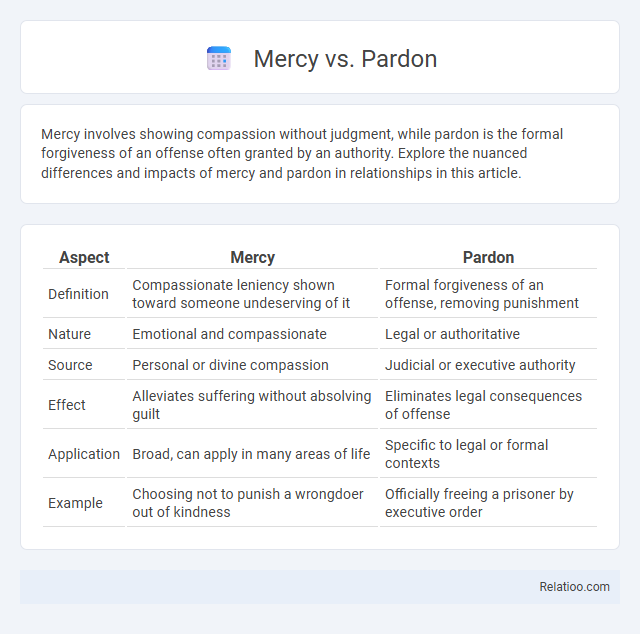Mercy involves showing compassion without judgment, while pardon is the formal forgiveness of an offense often granted by an authority. Explore the nuanced differences and impacts of mercy and pardon in relationships in this article.
Table of Comparison
| Aspect | Mercy | Pardon |
|---|---|---|
| Definition | Compassionate leniency shown toward someone undeserving of it | Formal forgiveness of an offense, removing punishment |
| Nature | Emotional and compassionate | Legal or authoritative |
| Source | Personal or divine compassion | Judicial or executive authority |
| Effect | Alleviates suffering without absolving guilt | Eliminates legal consequences of offense |
| Application | Broad, can apply in many areas of life | Specific to legal or formal contexts |
| Example | Choosing not to punish a wrongdoer out of kindness | Officially freeing a prisoner by executive order |
Defining Mercy and Pardon
Mercy involves compassion and leniency shown towards someone who could be punished, emphasizing forgiveness and reduction of deserved penalty. Pardon is a formal forgiveness granted by an authority, often erasing legal consequences of an offense and restoring rights. While mercy reflects an emotional response to wrongdoing, pardon is a legal act that absolves guilt and prevents punishment.
Historical Perspectives on Mercy and Pardon
Historical perspectives on mercy and pardon reveal distinct roles in judicial and royal contexts, where mercy often implied compassionate leniency granted by sovereigns, reflecting ethical or religious values. Pardons historically served as formal legal instruments to absolve offenses, restoring rights without negating guilt, demonstrating authority and political strategy. Over time, mercy expanded beyond punishment to symbolize humanitarian ideals, whereas pardons maintained a primarily legal framework for clemency.
Legal Distinctions Between Mercy and Pardon
Mercy and pardon are distinct legal concepts where mercy refers to compassion or leniency shown by a governing authority, often reducing the severity of a punishment without nullifying the conviction, while a pardon is an official forgiveness that removes legal consequences of a crime entirely. Your understanding of these distinctions is crucial, as a pardon restores rights and erases the conviction from your record, whereas mercy may only mitigate the penalty imposed. Legal systems typically reserve the power of pardon for executive authorities, such as presidents or governors, underscoring its role as a formal act with significant legal impact.
Philosophical Foundations of Mercy
Mercy, distinct from pardon, involves a compassionate response rooted in moral and ethical considerations, reflecting an acknowledgment of human imperfection and the value of forgiveness beyond strict justice. Philosophically, mercy embodies an intentional act of kindness that transcends legal obligations, emphasizing empathy and the suspension of retribution in favor of healing and reconciliation. This concept underpins theories of justice that balance fairness with humanity, illustrating mercy's role as a fundamental element in ethical decision-making and social harmony.
The Role of Pardon in Judicial Systems
Pardon plays a critical role in judicial systems by officially forgiving a convicted individual, effectively nullifying legal consequences and restoring rights lost due to the conviction. Unlike mercy, which is often a compassionate act without altering legal status, a pardon legally absolves the offender, sometimes issued by heads of state or government authorities as an act of clemency. This legal mechanism serves as a corrective tool within the justice system, balancing enforcement with rehabilitation and acknowledging potential miscarriages of justice.
Ethical Considerations: Mercy vs Pardon
Mercy involves compassionately withholding deserved punishment based on ethical empathy, while pardon is a formal forgiveness that legally removes or reduces a penalty. Ethical considerations of mercy emphasize moral judgment and the humanity of the individual, recognizing circumstances that warrant leniency beyond strict justice. Pardon centers on justice system protocols and legal authority, potentially addressing errors or humanitarian grounds but less focused on personal ethical deliberation.
Mercy in Religious and Cultural Contexts
Mercy in religious and cultural contexts embodies compassion and forgiveness extended by a higher power or community despite deserving punishment. It reflects divine grace in Christianity, where God's mercy is central to salvation, and in Islam, where Allah's mercy guides ethical conduct and repentance. Cultural interpretations of mercy often emphasize restoring harmony and offering kindness beyond justice or pardon, strengthening social bonds and moral values.
The Political Impact of Granting Pardon
Granting a pardon carries significant political impact by often signaling executive authority and influencing public perception of justice and mercy within governance. Pardons can reshape political alliances and affect voter support, as they may be viewed as acts of clemency or controversial decisions depending on the context and individuals involved. The strategic use of pardons serves as a tool to balance punishment with forgiveness while reflecting the values and priorities of political leadership.
Famous Cases Illustrating Mercy and Pardon
Famous cases such as Nelson Mandela's release from prison demonstrate the profound impact of mercy in fostering reconciliation and social healing, while instances like President Gerald Ford's pardon of Richard Nixon highlight the political and legal complexities involved in granting pardon. Mercy often involves compassion and leniency during adjudication or punishment, whereas pardon is a formal forgiveness that may restore civil rights and remove legal consequences. Understanding how your perspective on mercy versus pardon shapes justice can guide expectations in legal or personal contexts.
Contemporary Debates: The Balance Between Justice and Compassion
Contemporary debates on mercy, pardon, and clemency highlight the delicate balance between justice and compassion within legal systems worldwide. Mercy emphasizes leniency and forgiveness often grounded in moral or humanitarian reasons, while pardon represents formal forgiveness that mitigates or nullifies legal penalties. Clemency serves as a broader mechanism allowing authorities to reduce sentences, reflecting evolving societal values and ethical considerations in criminal justice reform.

Infographic: Mercy vs Pardon
 relatioo.com
relatioo.com